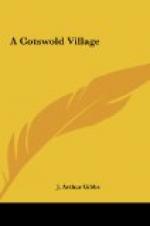[Footnote 37: 2 Henry VI., II. i.]
But it was not the death of the poor partridge that appealed to the poet’s mind so much as the pride and cunning of the mighty peregrine, and the beauty and stillness of the autumnal morning. He loved to hear the faint tinkling of the falcon’s bells, the homely cry of the plover, and the sweet carol of the lark; but more than all he felt the mystery of the downs, wondering by what power and when those old seas were converted into a sea of grass.
But whilst the hawking party was moving slowly across the wolds to try fresh ground an event occurred which had the effect of bringing the morning’s sport, as far as hawks were concerned, to an abrupt conclusion. This was nothing more nor less than the sight of a great Cotswold fox of the greyhound breed making his way towards a copse on the squire’s demesne. The quick eye of the Peregrine family was the first to view him, and forthwith both Bill and his brother screamed in unison: “What’s that sneaking across Smoke Acre yonder? ’Tis a fox—a great, lanky, thieving, villainous fox, darned if it ain’t!”
“Where?” said parson and squire excitedly.
“There,” said Peregrine, “over agin Smoke Acre.”
“By jabbers, so it be!” said the parson. “Now look thee here, Joe Peregrine, go thee to the sexton and tell ’un to ring the church bells for the folks to come for a fox; and be sure and tell the churchwardens.”
“Ah!” said the poet, almost as excited as the rest of the party,
“’And do
not stand on quillets how to slay him:
Be it by gins,
by snares, by subtlety,
Sleeping or waking,
’tis no matter how,
So he be dead.’”
[38]
[Footnote 38: 2 Henry VI., III. i.]
Thus abruptly ended this hawking expedition on the Cotswolds; for the whole party made off to the manor house to fetch guns, spades, pickaxes, and dogs, as was the custom in those days, when a “lanky, villainous fox” was viewed.
As for Shakespeare, after bidding adieu to the old squire, and thanking him for his hospitality, he mounted his game little Irish hobby and steered his course due northward for Stow-on-the-Wold. His track lay along the old Fossway, a road infested in those days by murderous highwaymen; yet, unarmed and unattended, unknown and unappreciated, did that mighty man of genius set cheerfully out on his long and solitary way.
[Illustration: The Abbey Gateway, Cirencester 295.png]
CHAPTER XIII.
CIRENCESTER.
The ancient town of Cirencester—the Caerceri of the early Britons, the Corinium of the Romans, and the Saxon Cyrencerne—has been a place of importance on the Cotswolds from time immemorial. The abbreviations Cisetre and Cysseter were in use as long ago as the fifteenth century, though some of the natives are now in the habit of calling it Ciren. The correct modern abbreviation is Ciceter.




